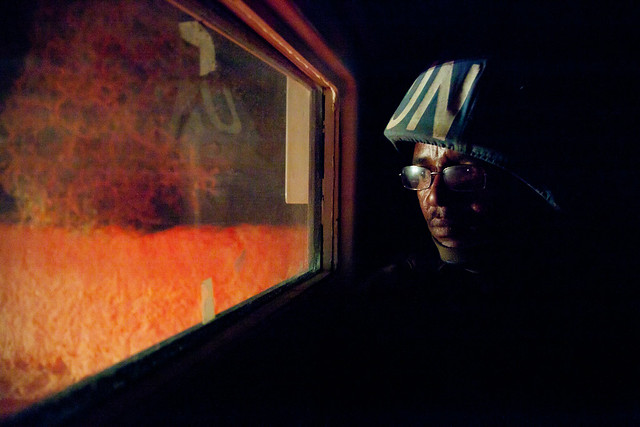Tribal fighting kills 510 in Darfur, says MP
February 25, 2013 (KHARTOUM) – Tribal clashes over control of lucrative gold mines in North Darfur state have killed more than 500 people and wounded some 865 since January, a Sudanese lawmaker said on Monday, in what is a sharp increase on previous estimates given for the number of casualties from the violence.

Peacekeepers on night patrol to stem banditry in a Darfur camp, 26 March 2012 (UN)
Adam Sheikha, a federal parliamentary representative for Al Sireaf district, told reporters 510 people had been killed since the outbreak of violence – the first estimates covering recent fighting to come from a member of Sudan’s ruling National Congress Party (NCP). The UN previously put the figure at 100.
Painting a grim picture of the situation on the ground, Sheikha said 15 women were raped, 68 villages were razed and another 120 partially burned down, while around 20,000 displaced families were in urgent need of humanitarian assistance, Reuters reported.
North Darfur’s El Sereif locality in the Jebel Amer area has been devastated by violence after fighting broke out on 5 January between rival Arab Beni Hussein and Abbala tribes over control of the region’s gold mines, resulting in the mass displacement of more than 100,000 people – the worst to take place in recent years.
Despite a peace deal signed last month between the two sides aimed at ending hostilities, fighting resumed last Thursday in the El Sereif area, killing 60 people, including children and women, and wounding more than 83.
Witnesses told Radio Dabanga that fighting began when well-armed Abballa militia and government border guards driving land cruiser vehicles and riding horses and camels attacked El Sereif area.
Sheikha was quoted by Reuters as saying that attackers had used government-issued weapons and vehicles during the attack, while some were on government salaries.
The fighting ceased on Saturday after the Sudanese government ordered an airstrike, killing several Abbala militants.
CIVILIAN SAFETY CONCERNS
The African Union-United Nations Mission in Darfur (UNAMID) on Sunday airlifted 37 wounded civilians, including one woman and two children, from El Sereif locality to the capital El Fasher for medical treatment, amid heightened concerns for civilians in the area.
UNAMID has also transported 2,700 kilograms of medical and other supplies to civilians in El Sereif affected by the tribal clashes.
In a press statement issued on Sunday, the UN resident and humanitarian coordinator in Sudan, Ali Al-Za’tari, expressed his “profound concern” about the safety and well-being of civilians in El Sereif locality, saying the latest violence “highlighted once more the vulnerability of civilians in the area”.
Responding to the latest violence, UNAMID said it had deployed peacekeepers to establish a temporary operating base in order to secure the area and facilitate the work of humanitarian organisations.
UNAMID’s officer in charge, Mohamed Yonis, called for an immediate end to tribal clashes, which have plagued North Darfur in recent months.
“There is no solution to this conflict other than one that is driven by good-faith efforts toward reconciliation,” he said.
“My hope is that, in the upcoming weeks, the tensions in the area will ease and the reconciliation process will resume,” he added, reiterating his organisation’s support for the local mediation process.”
HUMANITARIAN CRISIS
The worsening humanitarian crisis in the area has threatened to overwhelm aid agencies, which have been hampered in their response to the conflict due to constraints by the Sudanese government.
While agencies access to affected areas has recently improved, many displaced people remain without food, shelter, medicine and other basic services.
One resident from Al Sereif, quoted by Radio Dabanga, described the situation as “very bad” and “getting catastrophic”, with those who fled their homes to Saraf Omra after last month’s outbreak of hostilities between the Abbala and Beni Hussein tribes reportedly still living under trees, by creeks or on the outskirts of town.
Some 2,000 people displaced from the Jebel Amir area have settled in Saraf Omra, according to a needs assessment team that visited the area on 14 February. However, community leaders claim that the true numbers of displaced are about 18,500, the majority of which come from the Northern Reizegat tribe.
The United Nations estimates that around 300,000 people have died during the 10-year conflict in Sudan’s western Darfur region, while some 2 million people have been displaced after mainly non-Arab rebels took up arms against the Arab-led government in Khartoum in 2003, accusing it of neglecting Darfur and marginalising its people.
North Darfur continues to witness a number of tribal conflicts and remains one of the most volatile states in the region, with different rebel groups regularly clashing with forces from the Sudanese army.
(ST)
